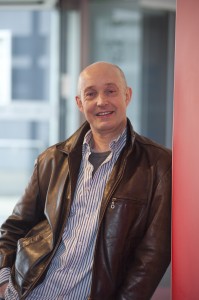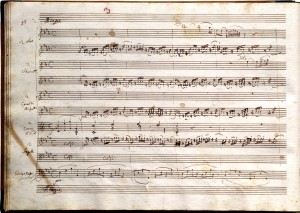Mark and Mozart in Cheltenham
 Mark Everist, professor of music, has been sharing his research on Mozart with concert audiences at the Cheltenham festival:
Mark Everist, professor of music, has been sharing his research on Mozart with concert audiences at the Cheltenham festival:
So, big culture-shock coming from a couple of days in a busy European capital earlier in the week to the Cotswolds beauty of Cheltenham – my first visit to the Festival. I was asked by the Arts and Humanities Research Council to coordinate spoken word contributions to this year’s programme, and my own contribution was based on my recent book Mozart’s Ghosts: Haunting the Halls of Musical Culture (Oxford University Press, 2012). I gave a talk for festival-goers about the reception of Mozart’s Serenade in B flat, K. 361, which was the focal piece on an exciting concert mixing this piece with recent works by British composers.
A great day started early with the talk before the concert – ‘Mozart heavy’ as the Festival Director Meurig Bowen put it. Very nice audience, the beginnings of good questions, but – as ever – a bit of a scramble to get into the auditorium in time to hear the New London Chamber Ensemble play three re-readings of Mozart’s very late music for mechanical organ and glass armonica. These ranged from Martin Butler’s sensitive transcription, through Philip Cashian’s transcription + period variations to Sally Beamish’s transcription and anything-but-period variations. These were followed by Cashian’s Dectet ‘Setella’s Machine’. Given that I was supposed to be talking to the Composer’s Academy in the afternoon, I was really paying attention and learned a lot. Some great playing in the final work, Mozart’s Serenade K 361, which is why I was really here in the first place.

After that it was straight into a really enjoyable session with the composer academy, opening up the general idea of reworking older pre-existing music. I love working with composers. As a music historian, the objects of my inquiry are mostly composers who are long dead (in some cases 800 years dead…) so it’s always interesting to talk to living ones and hear what they have to say. Worked alongside John Woolrich, Arlene Sierra and Kenneth Heskett with almost no agreement during the entire session (which is exactly how it should be) with well-judged contributions from the academy composers; I thought this was a great way to open up some fundamental questions about the nature of composition and originality for our students, and all credit to Peter Wield for coming up with the format.
An absorbing day ended with the drive back to the South Coast and a chance to catch up with Arcade Fire’s recent album Reflektor. Invite me back, Cheltenham, please!

